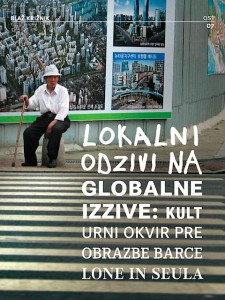Založba FDV | Ljubljana | 2009, ISBN 978-961-235-386-5 | 2012, ISBN 978-961-235-501-2 (ePub)
 The book Urban Change and Local culture in Barcelona and Seoul talks about how globalization influences everyday life in cities and about the importance of local culture for urban change. With a broad cross-cultural study of 22@ Activity District urban renewal in Poblenou in Barcelona and Wangsimni New Town urban redevelopment in Seoul the book reveals how structural inequalities on the global and national level influence everyday experience of both cities. Residents in Poblenou and Wangsimni actively respond to the changes in their everyday living environment, which are caused by the globalization, and in this way influence the transformation of both neighbourhoods. Contrary to a general belief that due to globalization cities are becoming more similar to each other, the book shows how local culture remains an important source of urban change in cities today, while being at the same time the source of their distinctiveness and diversity.
The book Urban Change and Local culture in Barcelona and Seoul talks about how globalization influences everyday life in cities and about the importance of local culture for urban change. With a broad cross-cultural study of 22@ Activity District urban renewal in Poblenou in Barcelona and Wangsimni New Town urban redevelopment in Seoul the book reveals how structural inequalities on the global and national level influence everyday experience of both cities. Residents in Poblenou and Wangsimni actively respond to the changes in their everyday living environment, which are caused by the globalization, and in this way influence the transformation of both neighbourhoods. Contrary to a general belief that due to globalization cities are becoming more similar to each other, the book shows how local culture remains an important source of urban change in cities today, while being at the same time the source of their distinctiveness and diversity.
